Historical Books of the Bible Meaning: Lessons from the Past
The Historical Books of the Bible, spanning from Joshua to Nehemiah, capture pivotal moments in Israel’s journey, from conquest and settlement to monarchy, exile, and restoration. These texts intertwine theological insights with historical events, emphasizing themes like divine providence, covenant fidelity, and leadership.
The narratives illustrate Israel’s cyclical patterns of disobedience and deliverance, the establishment of the monarchy, and the eventual division and exile of the kingdoms. In addition, Ruth exemplifies loyalty and redemption while Ezra and Nehemiah recount efforts of national restoration and reform.
Exploring these books provides deeper understanding of Israelite identity and divine interaction.
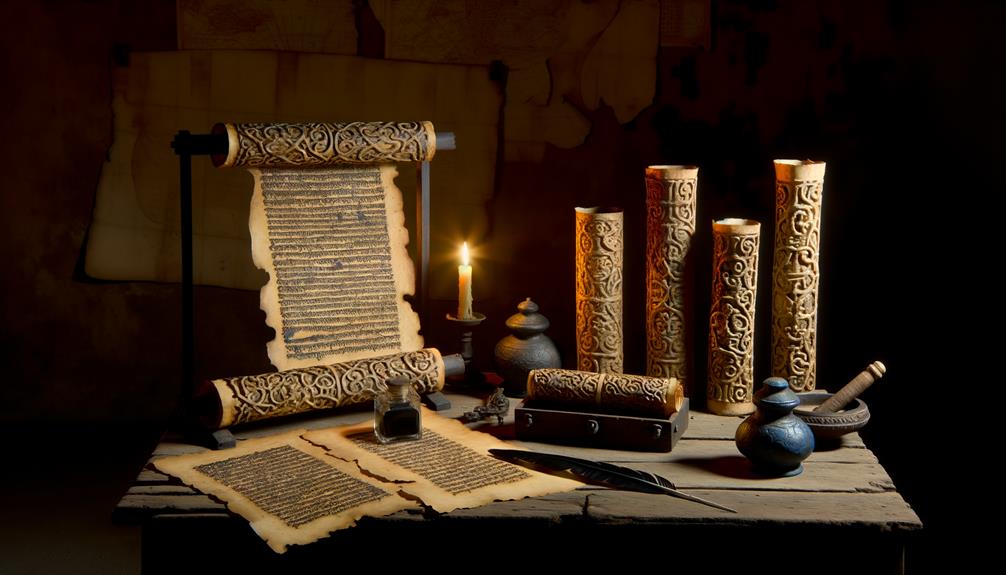
Historical Books of the Bible: Meaning, Themes, and Significance
| Aspect | Details |
|---|---|
| Definition | The historical books of the Bible record the history of Israel from conquest to exile and restoration. |
| Books Included | Joshua, Judges, Ruth, 1 & 2 Samuel, 1 & 2 Kings, 1 & 2 Chronicles, Ezra, Nehemiah, Esther. |
| Purpose | To document God’s faithfulness, the consequences of disobedience, and His redemptive plan through history. |
| Key Themes | Covenant, leadership, faith, judgment, restoration, and God’s sovereignty over nations. |
| Spiritual Significance | Provides lessons on obedience, reliance on God, and His unwavering faithfulness. |
| Cultural Context | Chronicles the cultural, political, and spiritual evolution of Israel and surrounding nations. |
| Practical Application | Encourages trust in God’s plans, highlights the importance of godly leadership, and inspires faith through historical examples. |
Joshua: Conquest and Settlement
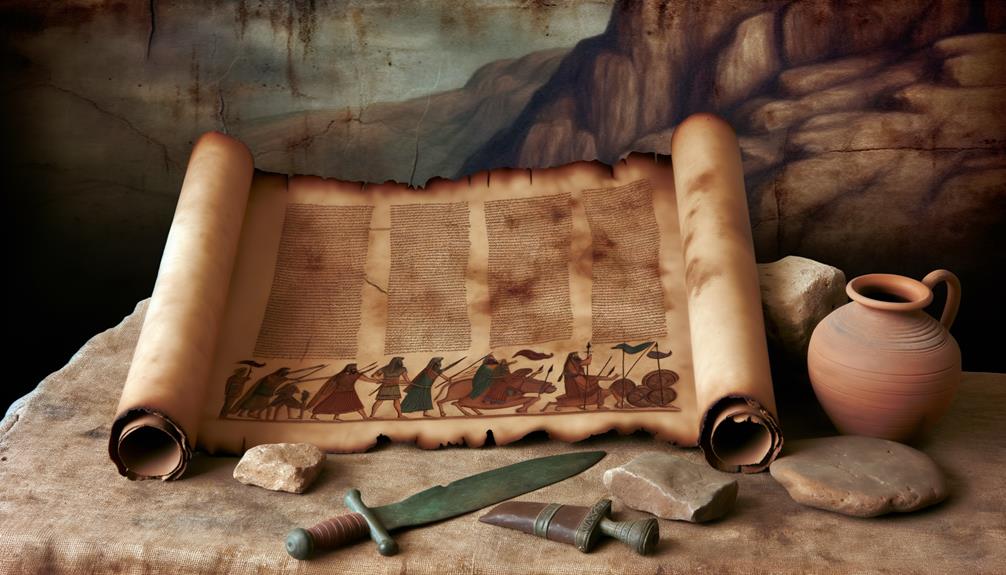
The Book of Joshua delineates the Israelites’ conquest of Canaan under Joshua’s leadership, marking a pivotal moment in their settlement within the Promised Land. This biblical narrative, rich in theological significance, underscores the fulfillment of Yahweh’s covenantal promises to Abraham, Isaac, and Jacob.
Joshua’s military campaigns, divinely sanctioned and meticulously chronicled, exhibit the interplay between divine providence and human agency. The strategic victories at Jericho and Ai, among others, are not merely historical records but are imbued with religious meaning, symbolizing the triumph of faith and obedience.
The subsequent division of land among the twelve tribes further solidifies the Israelites’ socio-political structure, embedding theological imperatives within their nascent national identity. This era represents a foundational chapter in Israelite history.
Judges: Cycles of Disobedience
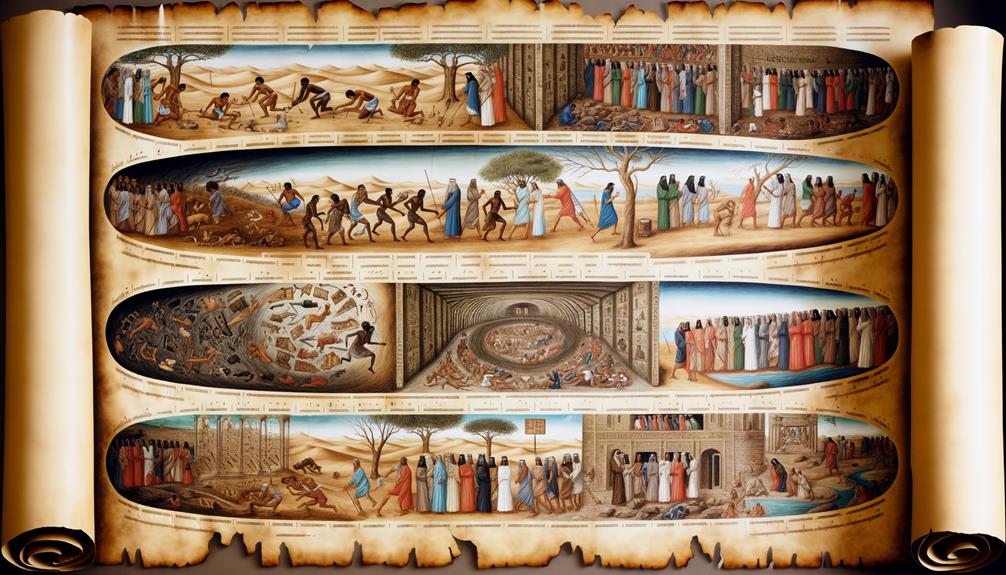
The Book of Judges narrates a recurring pattern of Israelite disobedience, divine punishment, cries for deliverance, and subsequent rescue by divinely appointed judges.
These cycles underscore Israel’s repeated failures to adhere to the covenantal laws, highlighting the theological theme of human fallibility and divine mercy.
Central to this narrative are the judges themselves, whose roles as military leaders and spiritual guides were vital in restoring order and fidelity among the Israelites.
Israel’s Repeated Failures
In the Book of Judges, Israel’s history is marked by a cyclical pattern of disobedience, oppression, repentance, and deliverance. This period portrays a nation struggling to adhere to the covenant with Yahweh, repeatedly forsaking divine commands.
The Israelites’ disobedience often led to their subjugation by surrounding nations, a consequence of their infidelity. Historical narratives in Judges illustrate not only the socio-political turmoil but also the theological implications of Israel’s failures.
Each cycle of sin and suffering reveals an intrinsic need for divine intervention and mercy. Theological insight highlights that these recurring failures underscore the necessity of covenant fidelity and the dire consequences of spiritual and moral lapses within a community chosen by God.
Deliverers and Their Roles
Throughout the Book of Judges, various deliverers emerge as pivotal figures, each raised by Yahweh to rescue Israel from the consequences of their cyclical disobedience.
These deliverers, often referred to as ‘judges,’ were divinely appointed leaders who restored order and righteousness amidst Israel’s recurring apostasy and oppression by foreign powers.
The narratives of Othniel, Ehud, Deborah, Gideon, and Samson, among others, illustrate the theological motif of divine mercy and justice.
Each judge’s tenure reflects a cycle of sin, servitude, supplication, and salvation, emphasizing the Israelites’ dependence on Yahweh.
Historically, these accounts underscore the socio-political instability of Israel during the pre-monarchic period, while theologically, they highlight the necessity of covenantal faithfulness to secure Yahweh’s continued favor and protection.
Ruth: Loyalty and Redemption
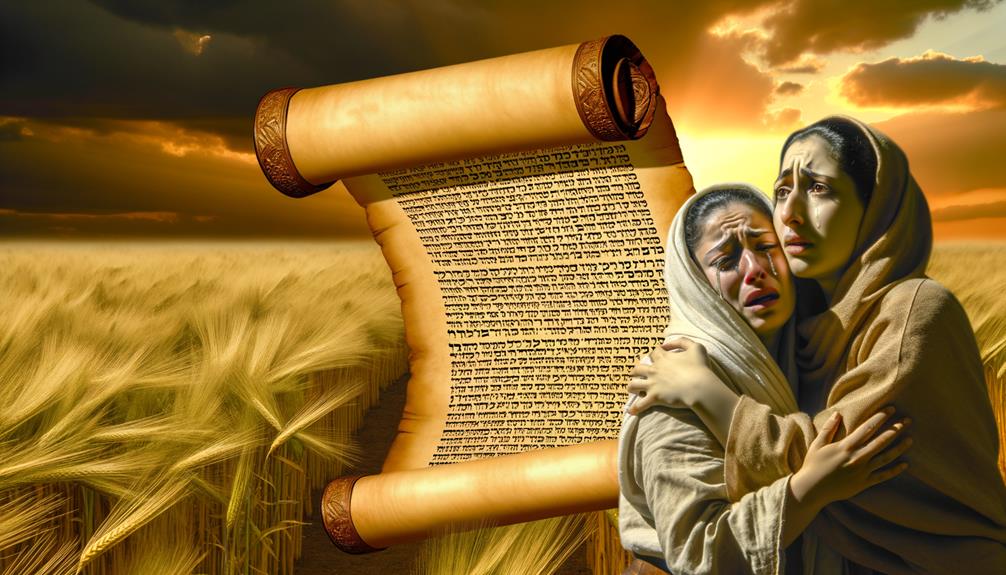
The Book of Ruth, set during the tumultuous period of the Judges, presents a narrative rich in themes of loyalty and redemption through the unwavering devotion of Ruth to her mother-in-law Naomi.
Boaz’s role as the kinsman-redeemer underscores the theological concept of God’s providential care and mercy.
Ruth’s faith and integration into the lineage of David not only highlight her personal legacy but also underscore the broader messianic implications within the biblical canon.
Ruth’s Unwavering Devotion
Ruth’s unwavering devotion to her mother-in-law Naomi stands as a profound tribute to loyalty and faithfulness within the historical and theological narrative of the Bible.
This Moabite woman’s decision to remain with Naomi despite the bleak prospects ahead is emblematic of covenantal love and fidelity.
Ruth’s declaration, ‘Where you go I will go, and where you stay I will stay’ (Ruth 1:16), transcends mere familial duty, illustrating a deeper theological commitment that resonates with the Hebrew concept of hesed—steadfast love.
Her actions embody a radical loyalty that not only guarantees Naomi’s survival but also intertwines Ruth’s destiny with the divine plan, ultimately positioning her within the lineage of King David and, by extension, the Messiah.
Boaz’s Role in Redemption
Integral to the narrative of Ruth, Boaz emerges as a pivotal figure whose actions embody the concept of the kinsman-redeemer, a role deeply rooted in the cultural and legal traditions of ancient Israel. By marrying Ruth, Boaz guarantees the preservation of Elimelech’s lineage and property, fulfilling the Levirate law. This act is not merely transactional but reflects profound themes of loyalty, compassion, and divine providence.
| Aspect | Description |
|---|---|
| Kinsman-Redeemer | Legal protector of family rights |
| Levirate Law | Duty to marry widow of deceased |
| Divine Providence | God’s guidance in human affairs |
Thus, Boaz’s role transcends mere obligation, highlighting the interplay between human agency and divine orchestration within the theological framework of redemption.
Legacy of Ruth’s Faith
Renowned for her unwavering loyalty and steadfast faith, Ruth’s life exemplifies the transformative power of devotion and its enduring impact on the lineage of Israel.
Ruth’s commitment to her mother-in-law, Naomi, and her adoption of the Israelite faith reveal profound theological implications.
Her story, situated in the tumultuous period of the Judges, underscores themes of divine providence and covenantal faithfulness.
Ruth’s eventual marriage to Boaz, a kinsman-redeemer, not only secures her and Naomi’s future but also integrates her into the Davidic line, ultimately leading to the Messianic lineage of Jesus.
Consequently, Ruth’s narrative is a reflection of the power of faith and loyalty, illustrating how individual devotion can influence the broader tapestry of salvation history.
Samuel: Rise of the Monarchy

The books of Samuel chronicle the pivotal shift of Israel from a loose confederation of tribes to a centralized monarchy under Saul and David, highlighting the complex interplay between divine providence and human agency.
These texts explore themes of leadership, covenant, and divine kingship. Samuel serves as a prophetic figure, anointing Saul and later David, whose reigns signify both divine favor and human frailty.
Saul’s tragic fall and David’s ascendancy underscore the theological assertion that true kingship in Israel is contingent upon adherence to God’s will.
The narrative intricately weaves historical events with theological reflections, offering insights into the formation of Israel’s national identity and the enduring tension between divine sovereignty and human responsibility.
Kings: Division and Exile
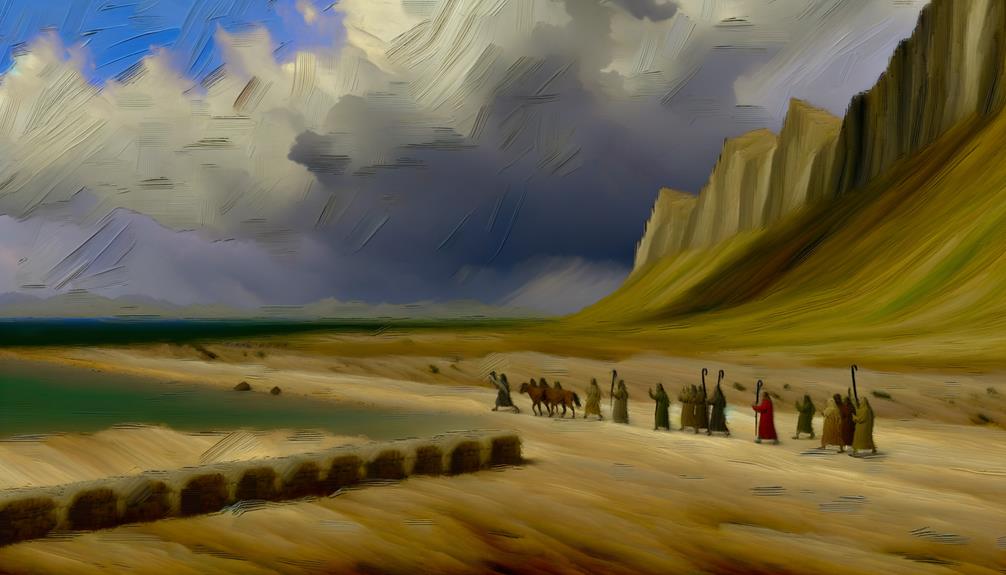
Building upon the establishment of the monarchy under Saul and David, the books of Kings narrate the subsequent division of the united kingdom into Israel and Judah, leading to a period marked by political fragmentation, prophetic intervention, and eventual exile.
This division commenced after Solomon’s reign, precipitating a series of conflicts, idolatrous practices, and social injustices.
The northern kingdom, Israel, succumbed to Assyrian conquest in 722 BCE, while the southern kingdom, Judah, was exiled by the Babylonians in 586 BCE.
Prophets such as Elijah, Elisha, Isaiah, and Jeremiah played vital roles, admonishing the people and leaders to return to covenantal faithfulness.
Their messages underscored themes of divine judgment, repentance, and hope amidst a backdrop of national decline.
Chronicles: Retelling Israel’s Past
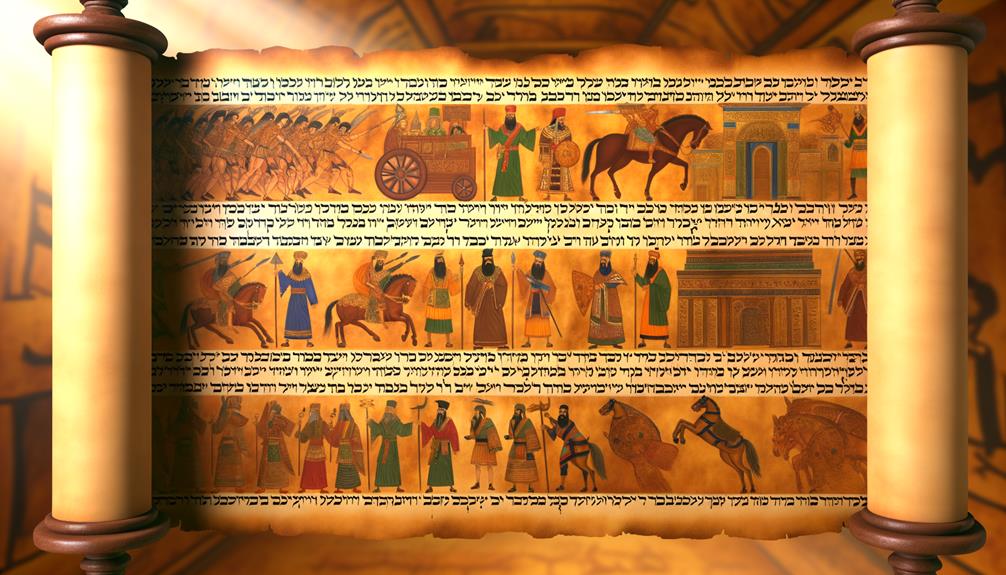
Chronicling the post-exilic community’s perspective, the books of Chronicles offer a theological reinterpretation of Israel’s history, emphasizing themes of covenant fidelity, temple worship, and divine kingship.
Unlike the Deuteronomistic history found in Samuel and Kings, Chronicles reexamines events to underscore Yahweh’s enduring commitment to Davidic lineage and the centrality of the Jerusalem Temple.
Genealogies, often tedious to modern readers, serve to link the returnees to their ancestral roots, fostering communal identity and continuity.
The Chronicler’s selective retelling omits certain transgressions to highlight God’s grace and the potential for restoration.
This historiographical approach aims to instill hope and encourage faithfulness among a community rebuilding its identity in the aftermath of exile.
Ezra and Nehemiah: Restoration and Reform
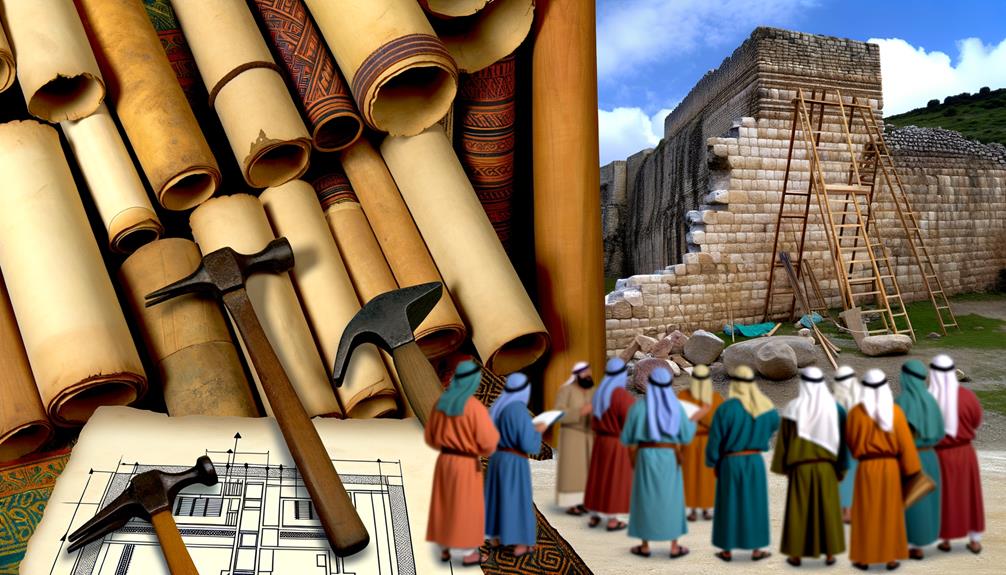
How do the books of Ezra and Nehemiah illuminate the processes of restoration and reform in post-exilic Israel, showcasing the intricate interplay between divine providence and human agency?
These texts underscore the spiritual and socio-political rejuvenation of Israel after Babylonian exile, emphasizing covenantal faithfulness and communal identity. Through the leadership of Ezra, a scribe and priest, and Nehemiah, a layman and governor, reforms were instituted to restore the Temple and Jerusalem’s walls.
- Divine Guidance: Both books highlight God’s hand in orchestrating events.
- Human Leadership: Effective leadership by Ezra and Nehemiah was essential.
- Covenantal Renewal: Emphasis on renewing the Mosaic covenant.
- Community Engagement: Involvement of the Israelite community in rebuilding efforts.
These elements collectively portray a nuanced narrative of restoration and reform.
Conclusion
In examining the historical books of the Bible, one observes a rich tapestry of conquest, disobedience, loyalty, monarchy, division, retelling, restoration, and reform.
An intriguing statistic underscores their significance: approximately 30% of the Old Scriptures is historical narrative. This heavy reliance on historical accounts not only enhances the understanding of cultural contexts but also provides insights into the beliefs and traditions of ancient civilizations. Among the many fascinating aspects of these scriptures is the inclusion of the longest word in the Bible, which serves as a testament to the intricate language and storytelling techniques employed in these ancient texts. Such elements invite readers to delve deeper into the rich tapestry of history that shapes their spiritual heritage.
These texts illuminate Israel’s complex journey, offering profound theological insights and a thorough understanding of its historical context.
Through these accounts, the enduring themes of divine providence and human agency are revealed, shaping theological discourse across centuries.






